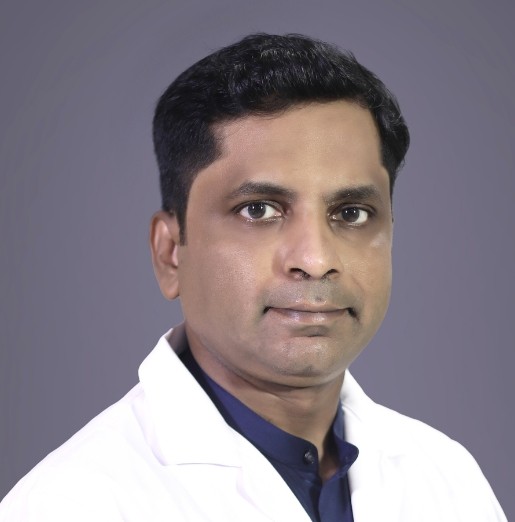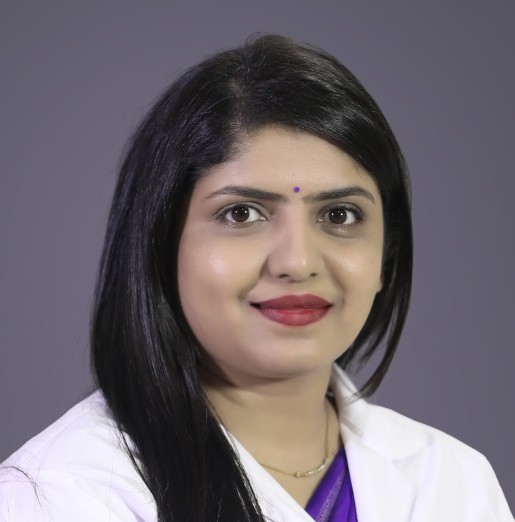The Internal Medicine Department at KIMS Hospitals in Electronic City combines a team of talented professionals. They aim to provide excellent care to patients and support the well-being of the community. They focus on training new doctors and researchers and improving health through innovative research methods.
At KIMS Hospitals in Electronic City, the Internal Medicine staff focuses their efforts on:
Helping patients with several health problems is their role. They assist people facing hard-to-identify conditions like breathing difficulties, kidney troubles, or high blood pressure in understanding their health better.
Team collaboration plays an important role. Your doctor might guide you to see other specialists such as surgeons or members of the multispecialty group at KIMS Hospitals in Electronic City. Internal medicine doctors come up with tailored treatment plans that fit well with the care you receive from your primary doctor.
They aim to improve healthy living, identify illnesses, and prevent them from progressing. This involves doing tests such as cholesterol screenings, blood pressure exams, mammograms, and Pap smears.
Who is an Internal Medicine Physician?
Internists, or doctors in internal medicine, treat and care for adults whether they are healthy or unwell. They do not focus on just one part of the body, like bones or the heart, but instead study how all body systems in adults connect and work as a whole. Their education and training help them prevent and manage diseases affecting adults.
Whether you have a sudden health problem need help managing a chronic illness, or deal with more than one medical issue, an internal medicine doctor can help. These doctors learn to tackle different health problems even the ones that are difficult to figure out. They take time to get to know you, understand your health history, and address your concerns. Along with treating problems, they make sure you have routine check-ups and get tests and vaccines to stay healthy.
Internal medicine doctors guide you to improve your health. They focus on women’s health, mental well-being, and substance abuse care. Regular issues related to eyes, ears, skin, nerves, or reproductive health often do not require a specialist. An internist can manage those concerns too.
Conditions and Diseases Addressed in Internal Medicine at KIMS Hospitals, Electronic City
1. Problems with Metabolism and Endocrine System
- Diabetes Mellitus: This lifelong condition happens when blood sugar stays too high and requires regular efforts to manage glucose.
- Thyroid Disorders (Hypothyroidism/Hyperthyroidism): The thyroid gland can either slow down or speed up hormone secretion, which affects how the body manages metabolism.
- Hyperlipidemia: High levels of cholesterol or triglycerides increase the likelihood of heart disease.
- Obesity: Excess body fat leads to metabolic-related health problems.
- Metabolic Syndrome: A group of issues, including too much belly fat, high cholesterol, abnormal blood pressure, and sugar level imbalances, increases the chances of heart conditions.
- Osteoporosis: A disease that causes bones to weaken and break.
2. Cardiovascular Conditions
- Hypertension (High Blood Pressure): This common health issue increases the risk of heart attacks or strokes if it goes untreated.
- Coronary Artery Disease (CAD): This condition happens when narrowed heart arteries reduce how much blood gets to the heart muscle.
- Heart Failure: The heart fails to pump enough blood to keep up with what the body needs in this ongoing condition.
- Arrhythmias: These are irregular heartbeats that may cause a fast pulse, dizziness or even sudden heart stoppage.
3. Lung-related Diseases
- Asthma: This ongoing illness causes swelling in the airways, which makes them tighter. Patients typically have trouble breathing and wheezing.
- Chronic Obstructive Pulmonary Disease (COPD): This persistent lung condition reduces airflow and makes breathing difficult.
- Pneumonia: This lung infection causes air sacs to swell because of bacteria, viruses or fungi.
- Bronchitis: This lung condition causes inflammation of the lining of your bronchial tubes and results in coughing and more mucus production.
4. Issues That Affect the Digestive System and Liver
- Gastritis: The stomach lining swells, which can bring pain, nausea, or difficulty digesting meals.
- Peptic Ulcer Disease: Sores develop inside the stomach or small intestine often due to NSAIDs or H. pylori bacteria.
- Irritable Bowel Syndrome (IBS): This condition in the gut leads to bloating, stomach aches, and changes in bathroom patterns.
- Liver conditions (Fatty Liver Hepatitis): Liver damage might involve anything from liver swelling to scarring and sometimes it develops into severe problems like hepatic cirrhosis.
5. Infectious Diseases
- Tuberculosis: This serious infection affects the lungs and requires antibiotics over a long period to treat.
- Urinary Tract Infection (UTI): Bacteria in the urinary system cause this infection, which often happens in women and older adults.
- Dengue, Typhoid, Malaria: These diseases are common in tropical regions. Sometimes these cause serious symptoms.
- HIV/AIDS: The virus attacks the immune system and requires continuous antiretroviral medicines.
6. Kidney and Electrolyte Issues
- Chronic Kidney Disease (CKD): When kidneys stop working, patients may require either dialysis or a transplant.
- Acute Kidney Injury (AKI): Sudden kidney failure caused by illnesses or toxic drugs.
- Electrolyte Imbalances (e.g., Hyponatremia, Hyperkalemia): Unusual levels of minerals and salts in the blood disrupt how organs perform.
7. Neurological Conditions (Non-surgical)
- Headache & Migraine: Doctors manage these common brain-related issues with drugs and changes to daily habits.
- Seizure Disorders (Epilepsy): This condition includes repeated seizures caused by abnormal electrical activity in the brain.
- Parkinson’s Disease: Medications and treatments are applied to deal with this progressive movement disorder.
- Stroke: They work on diagnosing and treating strokes also known as CVA.
8. Rheumatological and Autoimmune Diseases
- Rheumatoid Arthritis: It is an autoimmune disease in which you will develop painful and swollen joints.
- Systemic Lupus Erythematosus (SLE): An autoimmune condition that causes damage to your skin, joints, and many other organs in your body.
- Gout: It is a type of arthritis which happens due to development of uric acid crystals in your joints.
- Ankylosing Spondylitis: If you develop ankylosing spondylitis your spine and sacroiliac joints gets affected exhibiting stiffness and pain.
9. Issues With Blood
- Anemia: This condition happens when red blood cells or hemoglobin are lower than usual, which causes fatigue and lack of energy.
- Leukemia (early treatment): Blood cancer sometimes first shows up in internal medicine clinics before specialists take over the care.
- Bleeding Disorders: Conditions such as hemophilia or platelet problems need doctors to carefully examine and give the right treatment.
10. Everyday and Preventive Care
- Unexplained Fevers: Doctors use tests and check-ups to figure out why fevers happen without a clear reason.
- Regular Health Screenings: Routine check-ups help find diseases early and deal with any health risks.
- Allergy Management: An internal medicine doctor will help you with mild allergies like skin rashes, nasal problems, or reactions to medicines.
- Tiredness and Weakness: They try to find out the root cause of everyday complaints to know if the problem is due to poor health or diet.
11. Adult Vaccination
Most of us are aware of importance of adult vaccination but we hesitate to take them. They can prevent us from many diseases. If you are travelling to some countries, you have to take vaccines needed in those countries. Internal medicine specialists at KIMS Hospitals guide you through the recommended vaccines like flu, tetanus, diphtheria, whooping cough, HPV, hepatitis A and B, shingles, and pneumococcal disease.
When Should Someone See an Internal Medicine Doctor?
If you need an all-around adult care visit an internal medicine doctor. They will guide you through general check-ups and will be there with you for solving more complex health concerns. Below are five reasons why you need an internal medicine specialist:
To stay healthy and schedule regular check-ups:
These doctors identify health risks and create preventive plans specific to everyone. They run regular health tests to detect conditions like high blood pressure, cholesterol issues, or diabetes —before noticeable symptoms appear. They also provide vaccinations, conduct physical exams, and share lifestyle tips to help people avoid illnesses and maintain overall health.
When health problems show up:
Internal medicine doctors treat patients dealing with short-term issues like stomach troubles, urinary tract infections, or respiratory problems. They evaluate concerns like chest pain, fever, or extreme fatigue and work to address the underlying cause.
Managing long-term illnesses:
If you are suffering from chronic problems like diabetes, high blood pressure, arthritis, and heart disease you may need regular care and guidance.
Health issues related to ageing:
Ageing brings its own set of challenges that demand careful attention. Your internal medicine specialists concentrate on concerns like fragile bones, memory problems, and shifts in heart health. Routine visits help doctors notice changes tied to ageing and take steps to protect independence and overall health. These doctors work to prevent issues so older patients can remain active and well.



